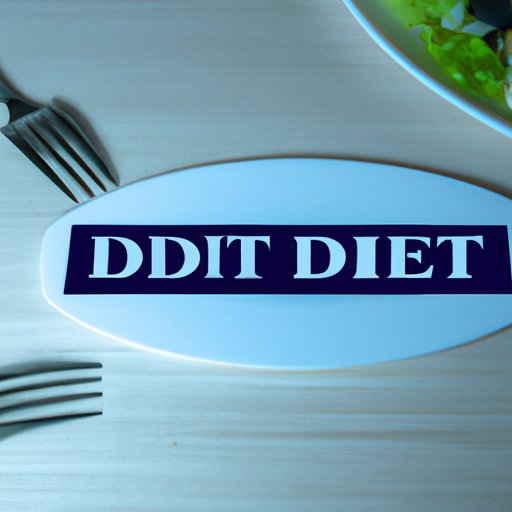Introduction
Dieting and weight loss are two of the most popular topics in the health and wellness industry. Millions of people struggle with their weight and turn to dieting as a solution. Unfortunately, many of these diets are ineffective, unsustainable, and even dangerous. In this article, we’ll explore why diets don’t work and uncover the science, psychology, and habits behind sustainable weight loss.
Examining the Science of Dieting and Weight Loss
To understand why diets don’t work, it’s important to examine the science of dieting and weight loss. Our body’s metabolism is the key to understanding how our bodies process food and use energy. Metabolism refers to the biochemical processes that occur in our cells to convert the foods we eat into energy.
The role of calories in weight loss is another important factor. Calories are units of energy found in the food we eat. To lose weight, we must consume fewer calories than we burn. This creates a caloric deficit, which forces our bodies to draw energy from stored fat. However, not all calories are created equal. Eating nutrient-dense foods that provide essential vitamins and minerals can help us lose weight more efficiently.
Nutritional deficiencies can also have an impact on our ability to lose weight. When we don’t get enough of certain vitamins and minerals, our bodies become less efficient at burning calories. A lack of essential nutrients can also cause us to feel fatigued, making it harder to stick to our diet and exercise routine.
Exploring the Psychology of Dieting and Its Impact on Long-Term Success
The psychology of dieting is just as important as the science. Our mindset plays a huge role in our ability to stick to our diet and achieve long-term success. Having a positive attitude and setting realistic goals can help us stay focused and motivated.
Emotional eating is another factor that can affect our weight loss efforts. Many of us turn to food for comfort when we’re feeling stressed or overwhelmed. This can lead to overeating and poor food choices, which can sabotage our weight loss efforts.
Finally, habits and self-control are essential for successful weight loss. Establishing healthy habits such as meal planning and regular exercise can help us reach our goals. Developing self-control and learning how to resist temptation are also important for maintaining a healthy lifestyle.

Investigating the Role of Exercise in Weight Loss
Exercise is another important factor in achieving sustainable weight loss. Regular physical activity not only burns calories, but it can also improve our mood and reduce stress. Combining aerobic exercise with strength training can help us build muscle and increase our metabolism, making it easier to lose weight.
However, it’s important to remember that exercise alone won’t result in significant weight loss if our diet isn’t also healthy. We must combine healthy eating habits with regular exercise for optimal results.

Assessing the Effects of Deprivation Diets and Unsustainable Eating Habits
Deprivation diets, or low-calorie diets, are often touted as the key to quick weight loss. While it’s true that reducing calorie intake can lead to weight loss, these types of diets can be dangerous and even counterproductive. Extremely low-calorie diets can lead to nutritional deficiencies and put undue stress on the body. They can also lead to yo-yo dieting, which is when we lose weight only to gain it back quickly.
It’s also important to consider the sustainability of our eating habits. Crash diets and extreme eating plans may offer quick results, but they’re often unsustainable in the long run. To achieve lasting weight loss, we must make changes that we can maintain for the rest of our lives.

Analyzing the Pros and Cons of Popular Fad Diets
Popular fad diets such as the keto diet, paleo diet, and intermittent fasting have gained traction in recent years. While these diets may offer some benefits, they’re not necessarily the best choice for everyone. It’s important to research each diet carefully and consult with a healthcare professional before making any major changes to your eating habits.
The keto diet, for example, is a high-fat, low-carbohydrate diet that has been shown to be effective for weight loss. However, it can be difficult to maintain over the long term and may lead to nutritional deficiencies. The paleo diet is another popular option, but it can be expensive and difficult to follow. Intermittent fasting involves cycles of eating and fasting, but it can be difficult to stick to and can lead to feelings of deprivation.
Conclusion
Diets don’t work because they’re often unsustainable and can have negative impacts on our health. To achieve sustainable weight loss, we must understand the science of dieting and weight loss, the psychology of dieting, and the role of exercise. We should also avoid deprivation diets and unsustainable eating habits, and be wary of popular fad diets. By making small, sustainable changes to our diet and lifestyle, we can achieve long-term success.
(Note: Is this article not meeting your expectations? Do you have knowledge or insights to share? Unlock new opportunities and expand your reach by joining our authors team. Click Registration to join us and share your expertise with our readers.)
